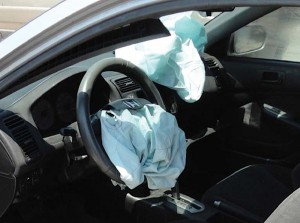(This story has been updated.)
Already under fire for its handling of several recent major safety issues, the National Highway Traffic Safety Administration continues to debate how far to expand the recall of vehicles equipped with potentially faulty airbags produced by Japanese supplier Takata Corp.
With NHTSA officials set to testify before Congress on Wednesday, the agency confirmed it is still seeking a nationwide recall of driver-side airbags, but that it is not yet calling for a similar action for passenger-side airbags. The safety agency was sharply criticized following its initial decision in October to order a recall of 7.8 million vehicles in areas with high humidity where the risk of airbag failures was considered most serious.
The big question is whether Takata will accept NHTSA’s midnight deadline and agree to go along with the expanded driver’s side airbag recall before tomorrow’s Capitol Hill hearing.
Takata Chairman Shigehisa Takada was expected to announce a decision on Tuesday but failed to reveal the company’s position.
He only stated that Takata will set up an independent panel that will audit the production of airbag inflators. Apparent quality controls lapses at two North American plants created defects that could result in inflators misfiring, sending shrapnel into the passenger compartment following a crash – a problem so far linked to at least five deaths and numerous injuries in the U.S. alone.Separately, several major customers of Takata have stepped into the debate. Honda called for “coordinated, industry-wide third-party testing” of Takata airbag inflators to see which actually need to be replaced.
“We believe that the industry can achieve greater results by sharing information and putting its collective efforts behind the same objective third party testing program,” said Rick Schostek, executive vice president of Honda North America, Inc. “Honda continues to quickly address the needs and concerns of our customers, and this industry-wide initiative will bring additional energy and focus to this effort.”
(Feds put down the hammer over Takata airbag defects. Click Here for the story.)
Takata airbags have been the subject of numerous recalls in recent years – some of those rolled into the recall announced by NHTSA last month. What the agency initially said it suspected is that some older Takata airbag inflators are particularly prone to malfunctioning when operated in areas of high humidity, such as Florida, Hawaii, Puerto Rico and the U.S. Virgin Islands.
That position has been echoed by Hiroshi Shimizu, Takata’s senior vice president for global quality assurance, who will be one of those to testify before a hearing planed by the House Subcommittee on Commerce, Manufacturing and Trade for tomorrow morning.
But as TheDetroitBureau.com first reported last month, three out of the five U.S. deaths so far linked to faulty Takata airbags have taken place outside of those high-humidity regions, leading critics to question the strategy of a limited geographic recall.
After initially insisting it would not expand the safety campaign, NHTSA then announced in November it would call on Takata to order a nationwide recall. The embattled supplier initially rejected the idea but was under heavy pressure to accept the broader campaign.
(Inside story: How GM botched its ignition switch recall. Click Here for more.)
The big concern has been whether Takata would be able to manage a nationwide recall that could expand the number of vehicles covered from around 8 million to an estimated 20 million or more.
“At this point, a national recall of all Takata air bags would divert replacement air bags from areas where they are clearly needed, putting lives at risk,” NHTSA Deputy Administrator David Friedman wrote in an advance statement to the House subcommittee.
Friedman also cautioned that a nationwide recall of passenger-side airbags “is not supported by the data as we now understand it.”
That position was challenged by Clarence Ditlow, director for the Center for Auto Safety, who told TheDetroitBureau.com, “Our position is that Takata should recall all the airbags, driver and passenger.” The Washington-based safety expert asserted that Takata relied on a propellant “that is essentially unstable over time,” adding that while the bags using that chemistry “rarely” fail, “when it does happen you’re very likely to be seriously injured or killed.”
Takata earlier this year said it was boosting production of replacement airbag inflators by 50%, to 450,000 a month. It has been under pressure to add even more production lines, a challenge that will become even more apparent if it agrees to any expansion of the October airbag recall.
(OPEC assuring fuel prices will stay low for some time. Click Here for the latest.)


Is it a great idea for Takata to basically thumb their nose at the US government? If NHTSA wants to, I think they can make things very difficult for Takata.